Following are updates shared from submissions of the Lutheran Office for World Community and state public policy offices (sppos) in the ELCA Advocacy Network this month. Full list and map of sppos available.
U.N. | CALIFORNIA | COLORADO | KANSAS | MINNESOTA | NEW MEXICO | OHIO | PENNSYLVANIA | TEXAS | WASHINGTON | WISCONSIN |
Lutheran Office for World Community (LOWC), United Nations, New York, N.Y. – ELCA.org/lowc
Christine Mangale, Director
From March 6-17, 2023, LOWC hosted 30 Lutheran Delegates who attended the Commission on the Status of Women (CSW) in New York. The delegation represented Lutherans from Africa, Asia, Middle East, Latin America and North America. They were Lutheran Clergy, lay leadership, staff, issue experts, and youth and young people from throughout the global church. The theme for this year focused on “Innovation and Technological change, and education in the digital age for achieving gender equality and the empowerment of all women and girls.” Our official statement to the Commission on the Status of Women in its 67th session is located here.
Lutheran delegates attended the CSW 67 both in-person and online (virtually) ensuring that the voices of faith-based organizations and communities were clearly represented in the Agreed Conclusions. Additionally, young delegates, including young Lutheran delegates from the ELCA Hunger Fellows program and the International Leaders Program took center stage at the commission. This is the first year that the CSW has included a youth session specifically for young people to engage with the theme of using technological innovation to promote gender justice and women’s empowerment.
The commission closed with Agreed Conclusions at 3:00 AM on March 18th. LWF and LOWC staff will circulate analysis and next-steps from our official delegation over the coming weeks and will circulate our reporting when it is complete
Our flagship event was entitled, Harnessing digital technologies to end sexual and gender-based violence Friday March 10, 2023. Event sponsored by Lutheran World Federation. Professor Antje Jackelén, archbishop emerita of the Church of Sweden, provided the session opened with greetings from the LWF General Secretary Rev. Dr. Anne Burghardt. Both interventions offered contextual grounding for the discussion. The session moved to a panel discussion moderated by ELCA Hunger Fellow Kayla Zopfi. The panel was made up of Rev. Dr. Debora Sinaga (Indonesia), Ameera Khamees (LWF Jordan), Miriam Alum (LWF Uganda) and Laura Gonzalez (LWF Columbia). Lutheran Pastor and Executive Director of Sonke Gender Justice, Rev. Bafana Khumalo (South Africa)**
Next year in March 2024, CSW 68 will focus on issues of Gender and Development Finance. Planning for our engagement in this important conference is beginning now.
For the first time in 46 years the UN hosted a “UN Water Conference.” Held in New York from March 22-24th 2023, LOWC hosted a delegation from ELCA World Hunger and ELCA Advocacy as they engaged the United Nation Member States on their contributions to increasing access to the human right to water. The Lutheran Delegation presented during two official side-events:
- United Nations Environmental Program (UNEP) Interfaith networking event ahead of the UN Water Conference 2023 on Thursday, 16 March 2023. Dr. Ryan Cumming, interim Director of World Hunger presented on behalf of the ELCA and LWF. Interventions issued to this event are available here.
- “Faith Community is a Blue Community” held on March 22nd, 2023. The World Council of Churches – Ecumenical Water Network and partner organizations, International Partnership on Religion and Development (PARD), Lutheran World Federation, Evangelical Lutheran Church in America, and World Evangelical Alliance hosted an official hybrid side event. Further details, including a recording of the side-event can be found here. Christine Moffett, interim Environmental Policy Program Director spoke for our Lutheran Community.
California
Lutheran Office of Public Policy – California (LOPP-CA) – lutheranpublicpolicyca.org
Regina Banks, Director
On Sunday, March 19, LOPP-CA the Lutheran Office of Public Policy – California joined other advocates in celebrating the end of the ICE contract at Yuba County Jail. The day included a musical performance by Japanese artists and a variety of testimonies by organizations that were a part of achieving the ending of the ICE contract, as well as from former incarcerated people at the facility. The rain couldn’t keep folks away from celebrating this advocacy success and looking ahead at the work yet to come for immigrant justice.
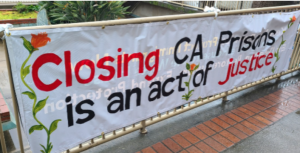
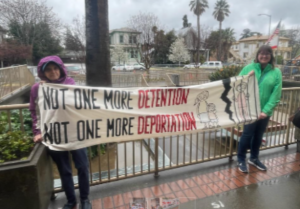
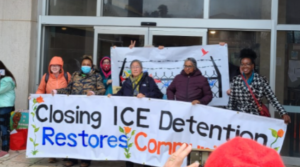
Registration remains open and active for our Lutheran Lobby Day on May 17th! Come join us for a full day of training, legislative meetings, and fellowship. Register here: https://lutheranpublicpolicyca.org/lutheran-lobby-day-2023
Colorado
Lutheran Advocacy Ministry Colorado (LAM-CO) – lam-co.org
Peter Severson, Director
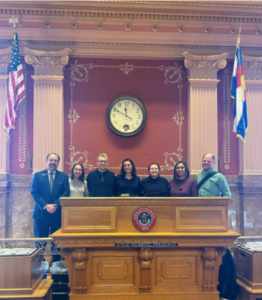
Urban Servant Corps volunteers with Sen. Robert Rodriguez (left) and LAM-CO Director Peter Severson (right) at the dais of the Colorado State Senate chamber.
LEGISLATIVE SESSION CONTINUES: The Colorado General Assembly has moved into consideration of the budget for the next fiscal year. In the past several weeks, the Assembly has taken the unusual step of meeting on the weekends to address bills that have generated significant debate and controversy. Ultimately, gun safety bills that raise the minimum eligible age of purchase, extend waiting periods, and expand Colorado’s ERPO (Extreme Risk Protection Order, or “Red Flag”) law have passed both chambers after lengthy delays.
Among the bills LAM-CO is actively working on, our Medical Debt Credit Reporting bill has passed both chambers with amendments. While the compromise bill is less ambitious than our original proposal, we still look forward to these substantial protections being signed into law by the Governor. Our bill to allow local decision-making on rent stabilization policies has passed the House, as has our bill creating just cause requirements for tenant eviction.
URBAN SERVANT CORPS AT THE CAPITOL: The volunteers with Urban Servant Corps, a service year program which invites volunteers into simple living and intentional community in Denver, joined Lutheran Advocacy for a day at the state Capitol in March. Representative Andy Boesenecker and Senator Robert Rodriguez both greeted the volunteers and spoke about their paths to public service, while also hearing from the volunteers about their experience serving at organizations in Denver.
Kansas
Rabbi Moti Rieber, Executive Director
The Kansas legislature concluded its main session last Thursday with a marathon session that lasted into the wee hours. Bills were bundled together, and policy that hadn’t been passed by either chamber was included in a demonstration of how broken the legislative process has become.
Public Education – Vouchers: A plan that would give families within 250% of the FPL up to $5000 toward private or parochial education narrowly passed the House but was defeated in the Senate. We expect this to come back during veto session.
LGBTQ+ issues – This session has seen a spate of bills targeting transgender individuals, particularly children. The governor’s veto of HB 2238 (the bill banning trans girls from girls’ sports) was overridden and now becomes law. SB 180 (“the women’s bill of rights”) was passed. SB 26 (a ban on gender-affirming care for minors) – which we had previously been told was dead in the House – became suddenly less dead. We expect 180 and 26 to be vetoed, and we will work to sustain the vetoes.
SNAP – A bill to impose work or training requirements on “Abods” between 50-59 was passed and is on the way to the governor. Another bill to make SNAP dependent on being current with child support failed in the Senate, and a bill to criminalize homeless encampments didn’t get out of committee.
Flat Tax – As in other red states, a high priority has been moving from a graduated income tax to a flat rate – a repudiation of over 100 years of the progressive income tax. In the conference committee, parts of the bill that benefit high-income Kansans got better, while the components that would benefit low- and middle-income Kansans were watered down. We are urging a veto.
Vaccine Requirements – A bill cobbled together in conference committee that would expand exemptions from childhood immunizations (among other dangerous policies) based on a because-I-said-so philosophical objection failed on the Senate floor (at 3AM Friday morning).
Elections – SB 209 would eliminate the three-day grace period for return of mail ballots, but it did not pass by a veto-proof majority.
There will now be a two-week break while the governor decides which of these bills to veto. The legislature will return on April 24, and they will have to pass education funding, which they haven’t done.
Minnesota
Tammy Walhof, Director
Legislative Session: This session continues to move at a dizzying speed with an unprecedented number of bills moving forward from committees to floor action.
Sacred Tiny Home Communities: The bill was included in the Senate Labor Committee Omnibus and the House Labor & Commerce Omnibus bill. We continue to work that
- The bill remains in the Omnibus bills,
- The Municipal “Opt Out” favored by the League of Cities NOT be included, and
- The “Intentional Neighbor” participant provision remain at 33-40%. (Attempts to make it 25% “to house more people experiencing homelessness” goes against research for healthy stable communities).
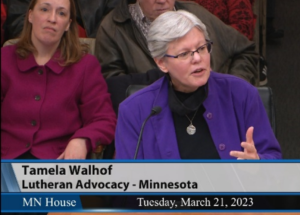
Lutheran Advocacy, Minnesota Director, Tammy Walhof, testifying.
Next Generation Climate Act: This bill updating our state’s greenhouse gas emissions targets to align with current climate science, is included in the House Climate Omnibus, but not the Senate Omnibus. Although 100% Clean Energy by 2040 has passed, benchmarks are needed for all sectors of the economy. The electrical sector is making strides in reducing harmful emissions, but other areas are increasing emissions.
Spending Targets: House and Senate leaders along with Gov. Walz released budget targets for Omnibus Spending Bills March 21, much earlier than the usual May time-frame.
- Housing Target: Affordable Housing has been allotted $1 billion. A large portion is one-time spending from surplus. With money allocated to other committees, housing-related needs could get as much as $1.4 billion.
- Clean Energy/Climate Target: Spending for a number of different bills is included in the targets, including solar on schools, incentives for electrification, and more.
New Mexico
Lutheran Advocacy Ministry New Mexico (LAM-NM) – lutheranadvocacynm.org
Kurt Rager, Director
Legislative Issue Briefing and Bishop’s Luncheon Returns
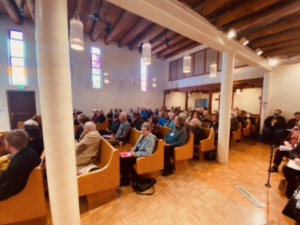 After a two-year pause caused by the Covid pandemic, the annual in-person Legislative Issue Briefing and Bishop’s Luncheon returned as focal-point for the New Mexico Legislative Session.
After a two-year pause caused by the Covid pandemic, the annual in-person Legislative Issue Briefing and Bishop’s Luncheon returned as focal-point for the New Mexico Legislative Session.
Legislative Issue Briefing: The morning began with Lutheran Advocacy Ministry – New Mexico (LAM-NM) supporters from across the state gathering at Bethlehem Lutheran (ELCA) in Santa Fe for an update on legislative issues and key bills being supported by LAM-NM during the session. Featured speakers addressed New Mexico’s abundance of revenue anticipated for FY24 and competing interests, tax reform, proposals to modernize the state’s legislature, legislation related to homelessness and lack of affordable housing in NM, and to a group of criminal justice reform bills being considered. LAM-NM works in strong partnership with the organizations represented by the speakers, including, New Mexico Voices for Children, New Mexico Coalition to End Homelessness, and ACLU – New Mexico. Participants were centered by a Bible study that began the day, led by Rev. Paul Schick.
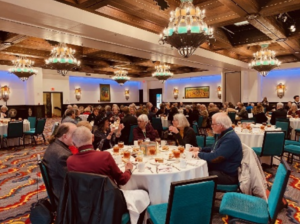 Bishop’s Luncheon: Following the conclusion of the Issue Briefing, participants moved to the historic La Fonda Hotel for the Bishop’s Luncheon, hosted by Bishop Jim Gonia of the Rocky Mountain Synod. During the meal, Legislator of the Year awards were presented to four legislators. From both the Senate and the House, these legislators were lead sponsors on priority legislation of LAM-NM over the last two legislative sessions. Legislation chosen included bills that capped store-front, short-term loans, at 36%, legislation that provides significant annual funding to the New Mexico Housing Trust Fund, and a constitutional amendment, overwhelmingly passed by voters, that taps the state’s massive Land Grant Permanent Fund of an additional 1.25%, much of which will go to support a robust expansion of Early Childhood care throughout the state. In addition, the annual John and Chris Haaland Advocacy Award was presented to St. Andrew Presbyterian Church of Albuquerque, for their long-sustained advocacy on local and state issues that are priorities for LAM-NM.
Bishop’s Luncheon: Following the conclusion of the Issue Briefing, participants moved to the historic La Fonda Hotel for the Bishop’s Luncheon, hosted by Bishop Jim Gonia of the Rocky Mountain Synod. During the meal, Legislator of the Year awards were presented to four legislators. From both the Senate and the House, these legislators were lead sponsors on priority legislation of LAM-NM over the last two legislative sessions. Legislation chosen included bills that capped store-front, short-term loans, at 36%, legislation that provides significant annual funding to the New Mexico Housing Trust Fund, and a constitutional amendment, overwhelmingly passed by voters, that taps the state’s massive Land Grant Permanent Fund of an additional 1.25%, much of which will go to support a robust expansion of Early Childhood care throughout the state. In addition, the annual John and Chris Haaland Advocacy Award was presented to St. Andrew Presbyterian Church of Albuquerque, for their long-sustained advocacy on local and state issues that are priorities for LAM-NM.
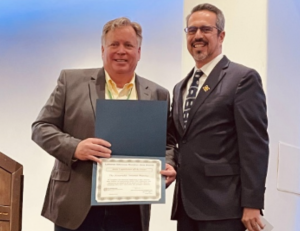 The entire day was well-received by all who attended. Attendees included members of Lutheran, Episcopal, Presbyterian, Methodist, United Church of Christ, Unitarian, Catholic, and Mennonite congregations throughout New Mexico.
The entire day was well-received by all who attended. Attendees included members of Lutheran, Episcopal, Presbyterian, Methodist, United Church of Christ, Unitarian, Catholic, and Mennonite congregations throughout New Mexico.
Ohio
Deacon Nick Bates, Director
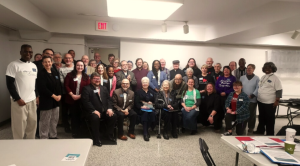 2023 Budget Advocacy Day
2023 Budget Advocacy Day
On March 28th, the Hunger Network in Ohio held our Budget Advocacy Day where we invited faith leaders to lobby at the Ohio Statehouse. We had over 40 Faith leaders join us and attend 23 legislative meetings with their representatives and senators. Our main focuses on the day included Hunger-Free Schools, Increasing SNAP Benefits for Seniors, and Increasing Food Bank Funding. We had an amazing time with this group of strong advocates who were able to show up and speak up for our communities.
Finance Committee Testimony:
Also on March 28th, Hunger Network’s Director, Nick Bates testified in front of the House Finance Committee. To read his testimony, click here!
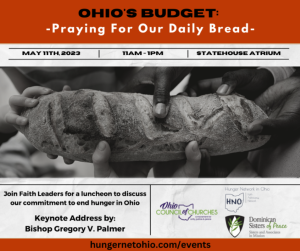 Upcoming Event:
Upcoming Event:
Praying for our Daily Bread: Luncheon at Ohio Statehouse
May 11th, from 11am – 1pm at the Ohio Statehouse Atrium
Join faith leaders, legislators, and advocates to discuss hunger in Ohio and what can be done to address it. We will hear from Bishop Gregory V. Palmer of the West Ohio Conference of the United Methodist Church, and legislative leaders about Ohio’s budget and efforts to reduce hunger in Ohio.
Pennsylvania
Lutheran Advocacy Ministry – Pennsylvania (LAMPa) lutheranadvocacypa.org
Tracey DePasquale, Director
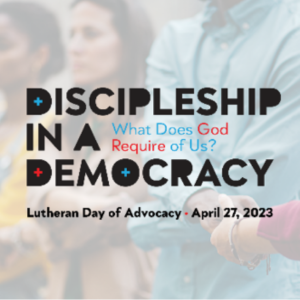 Lutheran Advocacy Ministry in Pennsylvania(LAMPa) is busy preparing for our first in-person Lutheran Day in the Capitol since 2019. The Rev. Dr. Roger Willer will keynote as we focus on a theme of Discipleship in a Democracy and progress on the new social statement. The day will feature workshops on hunger, housing, climate and clean water advocacy as well as building bridges for depolarization. We will celebrate advocates from every synod and make legislative visits to advocate on hunger and housing.
Lutheran Advocacy Ministry in Pennsylvania(LAMPa) is busy preparing for our first in-person Lutheran Day in the Capitol since 2019. The Rev. Dr. Roger Willer will keynote as we focus on a theme of Discipleship in a Democracy and progress on the new social statement. The day will feature workshops on hunger, housing, climate and clean water advocacy as well as building bridges for depolarization. We will celebrate advocates from every synod and make legislative visits to advocate on hunger and housing.
LAMPa participated in the Southwestern Pennsylvania Synod’s Commemoration of Martin Luther King Jr. as they honored his legacy with an ecumenical service of Holy Communion and a weekend focused the practice of nonviolence in their continuing efforts to build the Beloved Community in the Pittsburgh region with a priority on equitable housing. 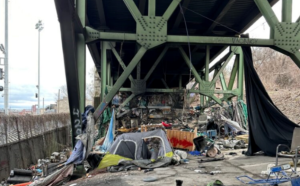 The weekend included a forum and panel discussion on state and federal housing advocacy priorities as well as the ELCA World Hunger housing resource, and an opportunity to visit ministries with unsheltered neighbors in the Pittsburgh region.
The weekend included a forum and panel discussion on state and federal housing advocacy priorities as well as the ELCA World Hunger housing resource, and an opportunity to visit ministries with unsheltered neighbors in the Pittsburgh region.
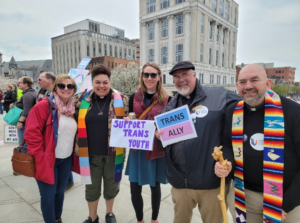 LAMPa Director Tracey DePasquale participated in the Pennsylvania Emergency Food Assistance Advisory Council spring meeting, taught at Trinity Lutheran Church in Reading and accompanied allies and advocates from United Lutheran Seminary and Lower Susquehanna Synod to a rally at the Capitol for Education Equity as part of the Trans Day of Visibility.
LAMPa Director Tracey DePasquale participated in the Pennsylvania Emergency Food Assistance Advisory Council spring meeting, taught at Trinity Lutheran Church in Reading and accompanied allies and advocates from United Lutheran Seminary and Lower Susquehanna Synod to a rally at the Capitol for Education Equity as part of the Trans Day of Visibility.
LAMPa is searching for a full-time communications and advocacy engagement manager. Learn more.
Texas
Scott Atnip, Outreach Director
The Texas Legislature in the middle of their 140 day biennial legislative session, and Texas Impact has mobilized Texans of faith, and specifically Lutheran leaders, to speak out on a wide range of issues.
Bishop Michael Rinehart participated in a prayer vigil to support LGBTQ+ Texans testifying against a number of anti-trans bills in the House. Bishop Sue Briner testified against similar bills in the Senate and co-authored an op-ed with Episcopal Bishop Suffragan Kai Ryan. All three ELCA Bishops in Texas signed a letter opposing anti-immigrant legislation, including bills to deputize volunteers to deport migrants.
Texans of faith participated in Texas Impact’s Annual Interfaith Advocacy Days. Lutherans are participating in and providing leadership in Texas Impact legislative teams, Rapid Response Teams and Legislative Engagement Groups on a wide range of issues, from maternal health and reproductive justice to immigration, protecting the LGBTQ+ community, protecting public schools and more. Synod leaders and congregations are sharing weekly Action Alerts and calls to action.
While most of the current focus is on the Texas Legislature, Texas Impact is funded to begin civic engagement work with Houston congregations, so planning is underway for a series of civic engagement programs and opportunities post-legislative session.
Washington
Faith Action Network (FAN) – fanwa.org
Elise DeGooyer, Director
We are nearing the end of the 2023 Washington State Legislative Session, scheduled to conclude April 23. FAN-supported safety net protections were among the first bills to pass and move to the Governor’s desk to be signed, including one unanimous bipartisan bill Concerning Hunger Relief that will allot an extra $28M to emergency food and nutrition services to begin to address the “hunger cliff” people are experiencing as their pandemic SNAP benefits ended. In a year when the economic forecast wasn’t bright, we still await final passage of the expansion of School Meals for More Students (bill trimmed from universal school meals due to cost), as well as a Hunger Free College Campus bill.
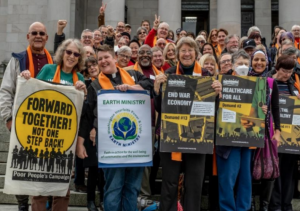
FAN advocates and colleagues continued to bring their multi-issue concerns to their legislators this session.
We are awaiting passage of some technical fixes to the Working Families Tax Credit, which launched February 1 and over 150,000 low-income people have applied for the credit, which provides up to $1,200 cash. FAN is involved in outreach about this credit to faith communities in multiple languages. Our coalitions’ economic justice bills to fix Washington’s regressive tax system–like a Wealth Tax, Guaranteed Basic Income, and so-called “baby bonds”—did not move this session.
Great news over Easter weekend that the Death Penalty would finally be removed from Washington state law, with the legislature passing the bill to remove it after the State Supreme Court’s declared it to be unconstitutional. In the wake of the tragic Tennessee and Kentucky shootings, the legislature passed FAN-supported bills to limit assault weapons, expand background checks and waiting periods, and hold the gun industry accountable to controls.
Agreement on a two-year state budget is pending, with FAN advocating for Health Equity for Immigrants and housing/homelessness funding in the final budget.
Wisconsin
Lutheran Office for Public Policy – Wisconsin (LOPPW) loppw.org
The Rev. Cindy Crane, Director
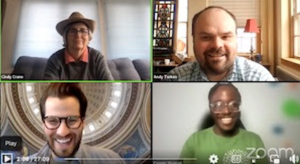 Wednesday Noon Live We interviewed Faith in Place staff, Alexander Malchow, Wisconsin Policy Coordinator, and Jonathan “Cosmic” Jackson, Wisconsin Outreach Coordinator.
Wednesday Noon Live We interviewed Faith in Place staff, Alexander Malchow, Wisconsin Policy Coordinator, and Jonathan “Cosmic” Jackson, Wisconsin Outreach Coordinator.
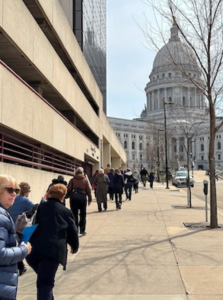 2023 Interfaith Advocacy Day and the Wisconsin State Budget
2023 Interfaith Advocacy Day and the Wisconsin State Budget
We had an inspiring 2023 Interfaith Advocacy Day, organized by LOPPW and Faith in Place, with great speakers and an engaged group we helped prepare to make visits at the Capitol.
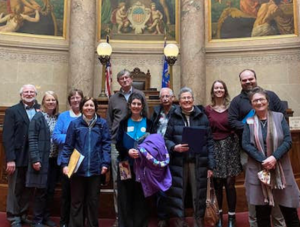 Wisconsin State Budget Tool Kit: Priorities related to energy efficiency, clean water, adaptation to climate change, youth justice, and driver licenses for undocumented Wisconsinites. The kit lists dates for public hearings and links for submitting your comments on the budget: Budget Talking Points & Public Hearings
Wisconsin State Budget Tool Kit: Priorities related to energy efficiency, clean water, adaptation to climate change, youth justice, and driver licenses for undocumented Wisconsinites. The kit lists dates for public hearings and links for submitting your comments on the budget: Budget Talking Points & Public Hearings
We made final plans for our April Youth Advocacy Retreat with leaders from synods around Wisconsin and the UP.




























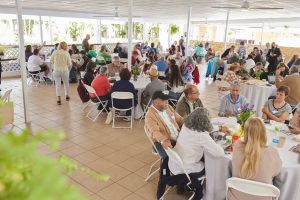
![[signed] +Christopher Harper](https://www.anglicanlutheran.ca/wp-content/uploads/chris-harper-signature.png)
![[signed] +Susan C Johnson](https://www.anglicanlutheran.ca/wp-content/uploads/Susan-Johnson-Signature.jpg)
![[signed] +Linda Nicholls](https://www.anglicanlutheran.ca/wp-content/uploads/nicholls-sig_black.png)

